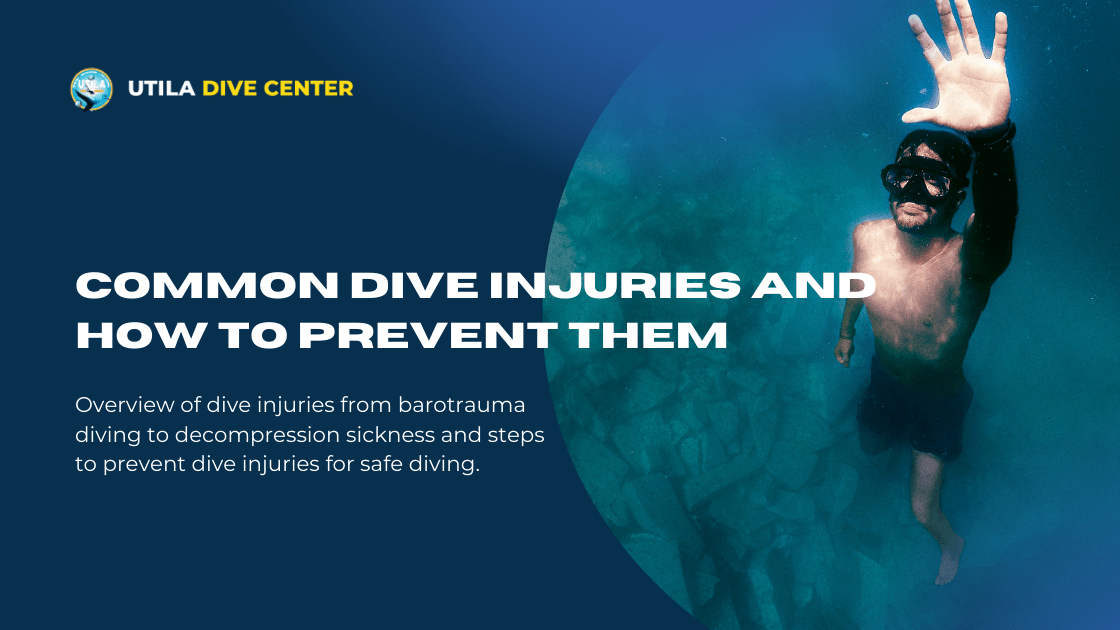
Common Dive Injuries and How to Prevent Them
Common Dive Injuries and How to Prevent Them
By: Manny Lagos | Date: 2025-09-29T10:02:16.534Z
Before you gear up and dive into the ocean, it’s worth taking a moment to understand what can go wrong, and how to avoid it. From ear squeezes to marine life mishaps, dive injuries can ruin your diving escapade if you’re not prepared.
Why Understanding SCUBA Diving Injuries Matters
Diving is undoubtedly one of the most exciting things you can do. Gliding weightlessly over coral reefs, swimming alongside sting rays, and uncovering hidden gems beneath the waves, sounds surreal, doesn’t it? But just like any other adventurous sport, it comes with its share of risks. From minor stings to serious decompression issues, dive injuries can sneak up on even the most seasoned divers if you're not prepared.
And here’s the thing: many common injuries in SCUBA diving are totally preventable. All it takes is a little knowledge, proper training, and some good diving habits – things we focus on every single day here at Utila Dive Centre.
Remote Dive Locations — Risks vs. Preparedness
Let’s talk reality for a second. A lot of the best diving happens in places that are far away from hospitals or emergency response. That remote wreck site or untouched reef might be stunning, but it also means you’ve got to be extra prepared. Oxygen may not be immediately available, and reaching a decompression chamber could take hours. That’s why being proactive is your best defense. At UDC, we have emergency procedures in place to make sure every diver is well taken care of, including access to a hyperbaric chamber just minutes from our dock. While this blog provides tips for diving anywhere in the world, it's important to know that when you're diving with us, you're in safe hands.
We also make sure divers of all levels are trained to spot early warning signs of SCUBA diving injuries and know how to respond with ease and confidence.
Understanding what can go wrong, and why, is the first step in building that confidence. That’s why we break it all down during training.
Now that we’ve talked about how location and preparedness go hand in hand, let’s look at the most common types of SCUBA diving injuries divers face.
Pressure-Related Dive Injuries: Barotrauma
Starting with one of the most talked-about issues in diving: barotrauma. This type of injury happens when pressure changes during a dive cause damage to the air-filled spaces in your body. Barotrauma diving injury is extremely common, especially for new divers or anyone diving with a cold.
Ear & Sinus Squeeze
Cause and Symptoms
Ever felt that sharp pinch in your ear when descending? That’s most likely the start of an ear squeeze. This happens when you can’t equalize the pressure in your ears or sinuses. In more severe cases, it can even result in a diving perforated eardrum, leaving you dizzy and disoriented underwater (surely not a place you want to be).
Prevention
Equalize early and often, that’s something we drill into all our students. Don’t dive if you’re congested. Seriously. It’s not worth the risk. Blow gently through your nose while pinching it to equalize your ears, and descend slowly. Freediving safety techniques, like controlling your breath and staying relaxed, can help too.
Mask Squeeze & Lung Overexpansion
Cause and Symptoms
Forget to equalize the air in your mask during descent, and you might end up with mask squeeze. Those tell-tale red rings around your eyes post-dive? We’re talking about that. It’s harmless, but uncomfortable and definitely doesn’t look good.
Lung overexpansion injury, on the other hand, is no joke. It happens when a diver holds their breath while ascending, causing air to expand in the lungs. This can lead to serious injuries like a ruptured lung or arterial gas embolism.
Prevention
Always exhale through your nose into your mask during descent to equalize it. More importantly, never hold your breath while ascending. Breathe continuously and ascend slowly, your lungs will thank you. Good SCUBA diving buoyancy control also helps prevent accidental rapid ascents.
Decompression Illness: Inert-Gas Disorders
Now we’re diving into deeper waters, literally and figuratively. Decompression illness (DCI) includes two major issues: decompression sickness (aka “the bends”) and arterial gas embolism. Both are serious, both are preventable, and both are covered thoroughly in our training at Utila Dive Centre.
Decompression Sickness (“the bends”)
Cause and Symptoms
When you dive, your body absorbs nitrogen. Come up too fast, and that nitrogen forms bubbles in your bloodstream. The result? Joint pain, rashes, dizziness, fatigue, and in extreme cases, paralysis. It’s one of the most well-known dive injuries for a reason.
Prevention
Stick to your dive plan. Use a reliable dive computer and respect no-decompression limits. Always do a safety stop, ascend slowly, and avoid pushing your depth or bottom time. Dive conditions and underwater navigation can throw off your timing, so stay sharp and plan your route carefully.
Arterial Gas Embolism (AGE)
Cause and Symptoms
AGE is a lung overexpansion injury that occurs when air bubbles force their way into your bloodstream during ascent. It’s fast, dangerous, and can cause chest pain, confusion, and even unconsciousness.
Prevention
Never, ever hold your breath. It sounds simple, but it’s the golden rule for good reason. Practice controlled ascents, monitor your depth, and make buoyancy your best friend.
Environmental & Marine Hazards
You’re a visitor in the underwater world, and like any tourist, it’s smart to respect the locals and your surroundings. Here’s what to watch out for:
Drowning & Out-of-Air Events
Running out of air is one of the most preventable, and still too common, causes of dive injuries. It’s usually a mix of poor air management, stress, or equipment failure.
Prevention tips:
- Always start with a full tank and monitor your air frequently.
- Practice emergency air-sharing skills regularly.
- Don’t push limits. End the dive with a healthy reserve.
- And always, always dive with a buddy.
Marine Life Dive Injuries (Stings, Bites, Abrasions)
The ocean is home to some amazing creatures, but not all are friendly. You might come across jellyfish, fire coral, lionfish, or even end up accidentally grabbing a sea urchin.
Prevention tips:
- Look but don’t touch.
- Keep a safe distance from marine life.
- Wear full suits or skins when diving in unfamiliar areas.
- And if something does sting or bite, know the basic first aid (something we cover in our rescue and Divemaster programs).
Body-Related Dive Injuries
Sometimes, the injury isn’t from pressure or critters, it’s from our movement, or lack of preparation.
Spinal, Wrist, Shoulder, Knee Strain
Cause and Symptoms
Carrying heavy tanks, awkward entries, or long surface swims can lead to overuse or strain injuries. You might feel soreness, tightness, or limited mobility. Watch out for that.
Prevention
Use correct lifting techniques (yes, there’s a trick to it!). Stay in shape between dives. And choose the right entry method for the conditions. Training in real-world scenarios, like we do at UDC, makes that muscle memory.
Head or Back Injury from Shallow Dives
Cause and Symptoms
Diving into shallow water or misjudging depth can result in a nasty head, neck, or spinal trauma. Who wants that?
Prevention
Always check the entry area and avoid headfirst jumps (unless it’s a verified deep site). Feet-first entries are safest. At Utila, our instructors assess every site and help you build safe habits to avoid SCUBA injuries right from the start.
Equipment & Human-Factor Risks
Many SCUBA injuries don’t come from marine life or extreme depth, they come from human error. Here’s how to avoid those slip-ups.
Gear Failure & Entanglement
Busted hoses, snagged lines, or tangled fins can cause trouble quickly.
Avoid it by:
- Doing pre-dive checks (we teach you a killer pre-dive routine).
- Keeping gear clean and serviced.
- Learning entanglement escape techniques.
Buoyancy Mismanagement
This one’s huge. Poor buoyancy control can cause lung overexpansion, rapid ascents, and bottom crashes.
Solution? Practice, practice, practice. And choose a dive center that focuses on skill-building. Simply put, SCUBA diving buoyancy is one of those things that separates a good diver from a great one.
Panic & Inadequate Training
Panic can turn a minor issue into a major emergency. It’s typically triggered by unfamiliar situations, such as a flooded mask or uncontrolled ascents, especially if you’re not sure how to respond. That’s why developing mental resilience is just as important as physical skills.
Prevention Strategy for Dive Injuries
So how do you stay safe? By combining knowledge, planning, and smart diving.
Here's what we teach every diver at UDC:
- Dive within your certification and comfort zone.
- Never dive if you're sick, tired, or dehydrated.
- Use the right gear and check it before every dive.
- Follow your dive plan and track your air.
- Take breaks between dives and don’t rush ascents.
- Respect marine life and the ocean.
The more confident you are, the less likely dive injuries are to happen. And with UDC's expert instructors by your side, you're never diving alone (even when you’re working toward solo certifications).
Emergency Protocols
When and Where to Get Help
If something goes wrong:
- Alert your buddy and ascend safely.
- Get on the boat and administer first aid if needed.
- Use oxygen if trained and call emergency services.
- Contact DAN or go to the nearest hyperbaric chamber ASAP.
We teach all this and more during our Rescue Diver course, a must for any diver looking to take their skills AND safety to the next level.
FAQ
Can I dive with a cold or congestion?
It’s best not to. Congestion can block your ability to equalize, increasing your risk of barotrauma diving injuries like sinus squeeze or diving perforated eardrum. If you feel blocked up, sit the dive out.
How long should I wait before flying?
Wondering how long after SCUBA diving can you fly? The general rule: wait at least 12 hours after a single dive, and 18-24 hours after multiple dives or decompression dives. Play it safe, give your body the time it needs to off-gas nitrogen.
Is it safe to dive solo during off-season?
Solo diving is a highly specialized skill, and even then, it’s riskier during the low season when dive conditions may vary. Most dive injuries happen when no one’s around to help. We always recommend diving with a buddy unless you're properly trained and fully equipped.
That said, if you want to learn how to dive independently, go for our Self-Reliant Diver Specialty course. It’s a great way to build confidence and get ready for solo diving by mastering skills like gas management, emergency self-rescue (and more), all under expert supervision!
Conclusion
SCUBA diving is life-changing, but like any adventure, it comes with certain responsibilities. From barotrauma diving injuries to marine stings, the risks are real, but preventable. When you dive smart, you dive safe.
At Utila Dive Centre, we don’t just certify people, we turn them into confident, knowledgeable divers who are ready for whatever the ocean throws their way.
Whether you’re just starting out or training to become a Divemaster or Instructor, we’ve got your back (and your buoyancy). Dive injuries may be common, but with the right training and mindset, they don’t have to be your story.
So, what are you waiting for?
References:
[1] – World.dan.org - Common diving injuries and how to avoid them
[2] – Cdc.gov - SCUBA diving decompression illness and other dive-related injuries
[3] – Balifundiving.com - The most common diving injuries and how to prevent them
[4] – Dan.org - Recognizing and preventing barotrauma
[5] – Balifundiving.com - The most common diving injuries and how to prevent them
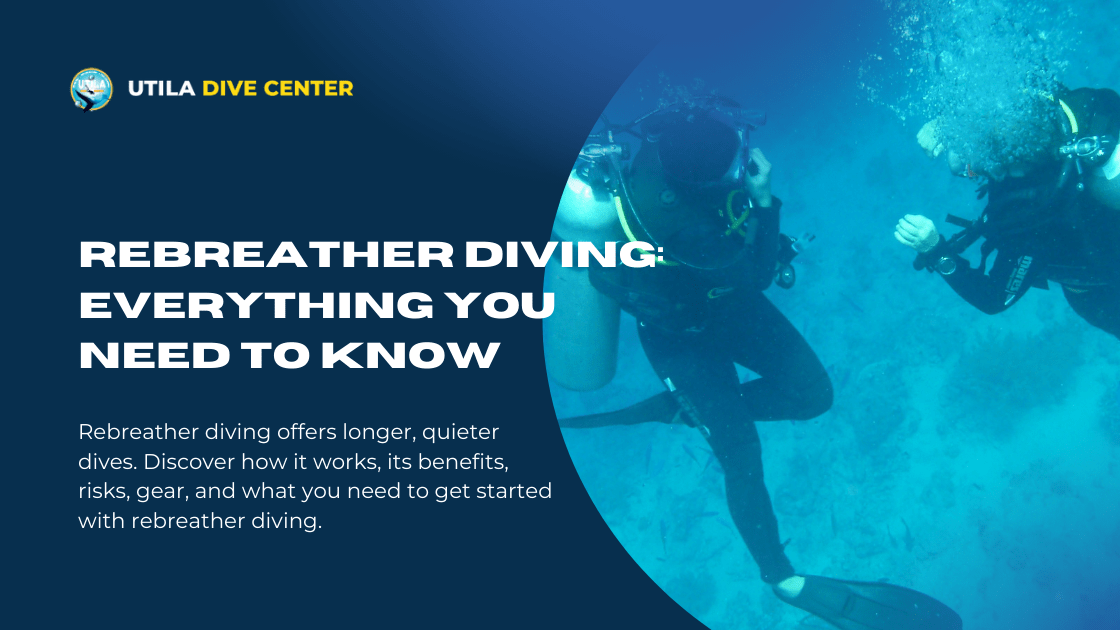
Rebreather Diving: Everything You Need to Know
Rebreather diving offers longer, quieter dives. Discover how it works, its benefits, risks, gear, and what you need to get started with rebreather diving.
Read more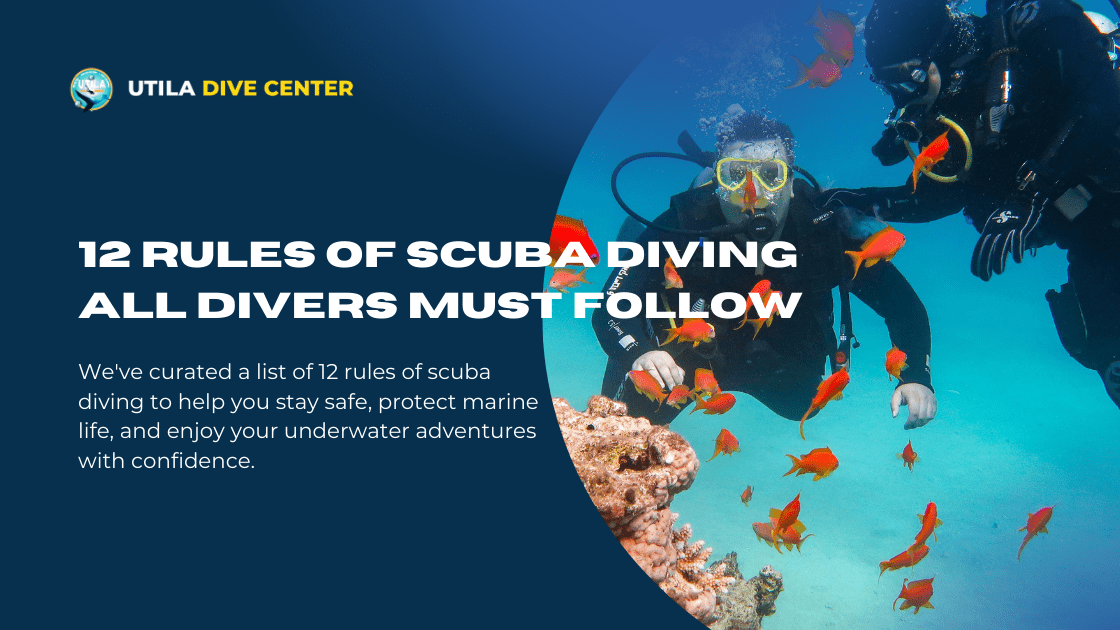
12 Rules of Scuba Diving All Divers Must Follow
We've curated a list of 12 rules of scuba diving to help you stay safe, protect marine life, and enjoy your underwater adventures with confidence.
Read more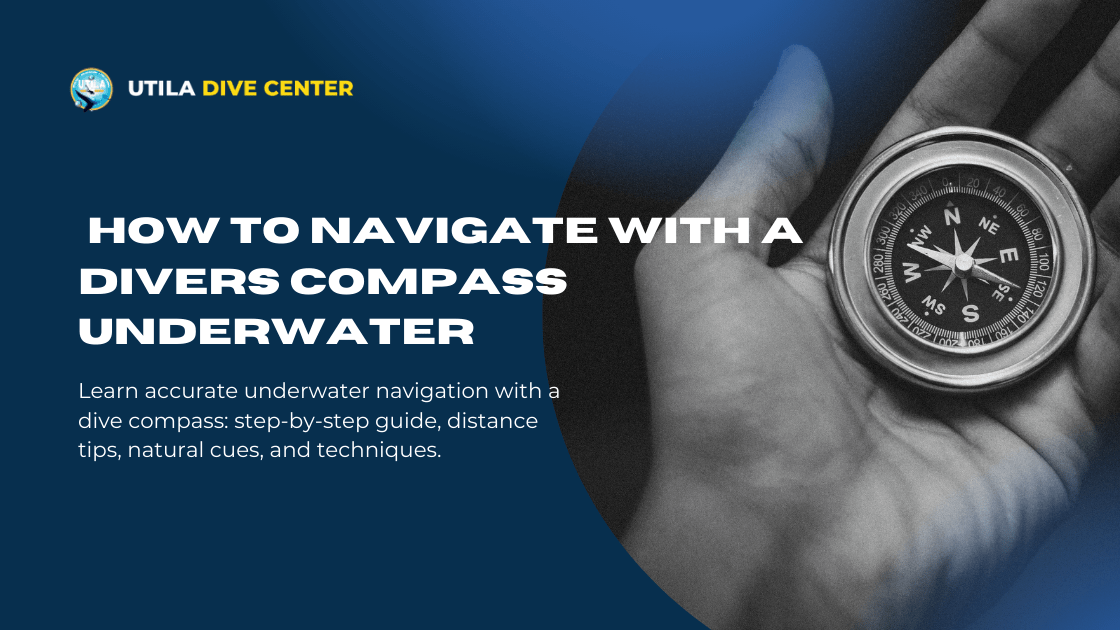
How to Navigate With a Divers Compass Underwater
Learn accurate underwater navigation with a dive compass: step-by-step guide, distance tips, natural cues, and techniques.
Read more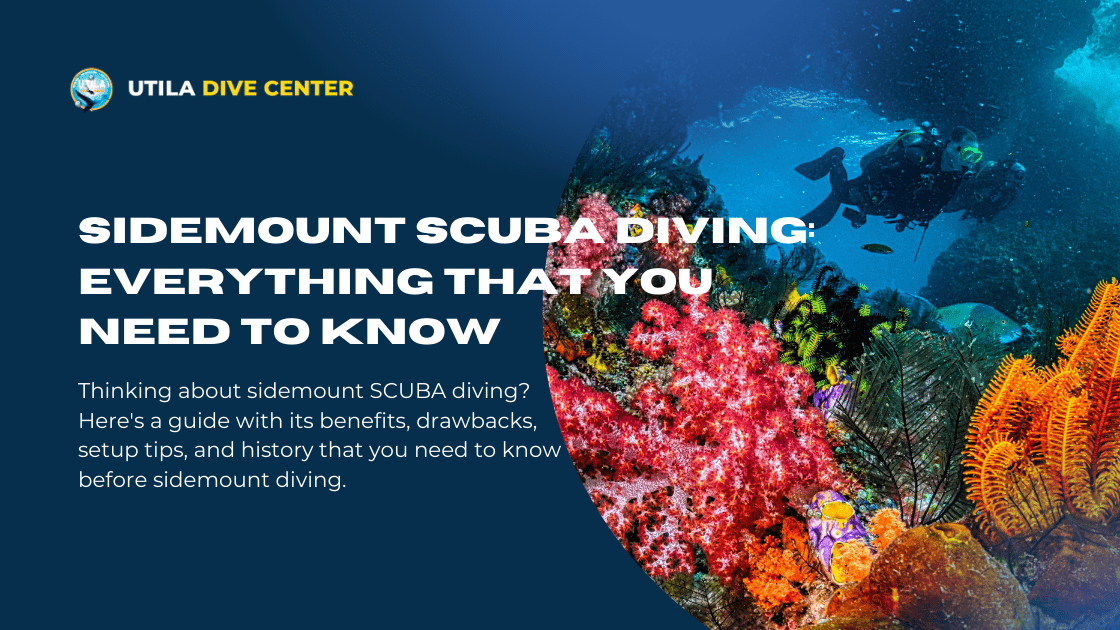
Sidemount SCUBA Diving: Everything That You Need To Know
Thinking about sidemount SCUBA diving? Here's a guide with its benefits, drawbacks, setup tips, and history that you need to know before sidemount diving.
Read more